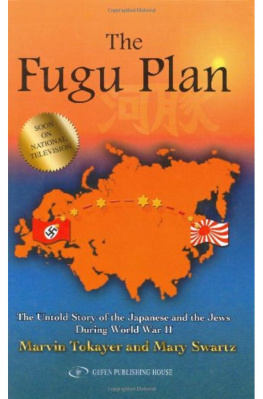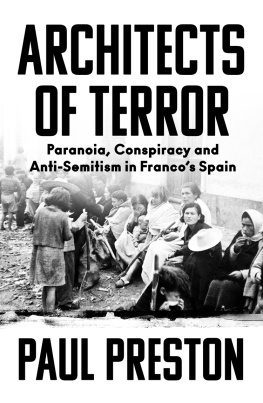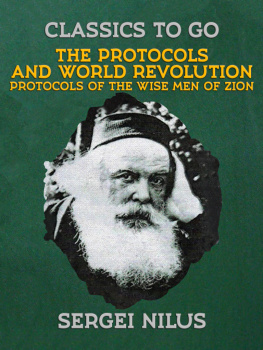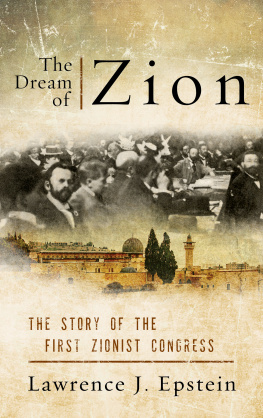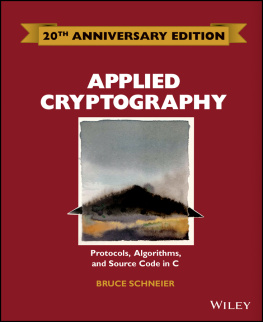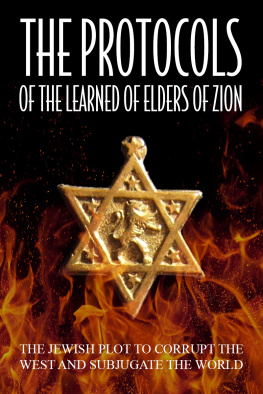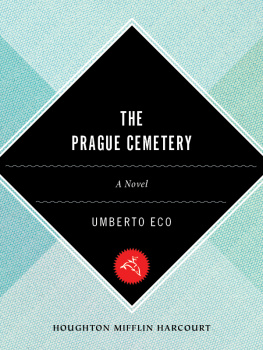The Paranoid Apocalypse
ELIE WIESEL CENTER FOR JUDAIC STUDIES SERIES
General Editor: Steven T. Katz
The Shtetl: New Evaluations
Edited by Steven T. Katz
The Paranoid Apocalypse:
A Hundred-Year Retrospective on The Protocols of the Elders of Zion
Edited by Richard Landes and Steven T. Katz
The Paranoid Apocalypse
A Hundred-Year Retrospective on
The Protocols of the Elders of Zion
EDITED BY
Richard Landes and Steven T. Katz

NEW YORK UNIVERSITY PRESS
New York and London
www.nyupress.org
2012 by New York University
All rights reserved
References to Internet websites (URLs) were accurate at the time of writing.
Neither the author nor New York University Press is responsible for URLs
that may have expired or changed since the manuscript was prepared.
Library of Congress Cataloging-in-Publication Data
The paranoid apocalypse : a hundred-year retrospective on the
Protocols of the elders of Zion / edited by Richard Landes and Steven T. Katz.
p. cm. (Elie Wiesel Center for Judaic Studies series)
Includes index.
ISBN 9780814748923 (cl : alk. paper)
ISBN 9780814748930 (ebook)
ISBN 9780814749456 (ebook)
1. Protocols of the wise men of Zion. 2. anti-Semitism.
I. Landes, Richard Allen. II. Katz, Steven T., 1944
DS145.P7P37 2011
305.8924dc22 2011028192
New York University Press books are printed on acid-free paper,
and their binding materials are chosen for strength and durability.
We strive to use environmentally responsible suppliers and materials
to the greatest extent possible in publishing our books.
Manufactured in the United States of America
10 9 8 7 6 5 4 3 2 1
Contents
1 Introduction: The Protocols at the Dawn of the 21st Century
Richard Landes and Steven T. Katz
PART I. Conceptual Prelude:
On Paranoid Politics and Apocalyptic Violence
2 The Melian Dialogue, the Protocols, and
the Paranoid Imperative Richard Landes
PART II. Medieval Prologue:
Cosmic Christian Anxiety and Global Modern Paranoia
4 The Devils Hoofs: The Medieval Roots of
The Protocols of the Elders of Zion
Jeffrey R. Woolf
5 Thomas of Monmouth and the Protocols of
the Sages of Narbonne
Johannes Heil
PART III. The Early Years:
The Apocalyptic Matrix of Genesis and Launch
6 The Antichrist as an Imminent Political Possibility:
Sergei Nilus and the Apocalyptical Reading of
The Protocols of the Elders of Zion
Michael Hagemeister
7 Protocols of the Elders of Zion: Thoughts on the
French Connection
Jeffrey Mehlman
8 Jewish World Conspiracy and the Question of Secular
Religions: An Interpretative Perspective
Paul Zawadski
9 The Turning Point: The Protocols of the Elders of Zion
and the Eschatological War between Aryans and Jews
David Redles
10 The Protocols in Japan
David G. Goodman
11 The Protocols of the Elders of Zion: An Authentic
Document in Palestinian Authority Ideology
Itamar Marcus and Barbara Crook
12 Anti-Semitism from Outer Space: The Protocols in
the UFO Subculture
Michael Barkun
13 The Protocols of the Elders of Zion on the Contemporary
American Scene: Historical Artifact or Current Threat?
Deborah Lipstadt
14 Protocols to the Left, Protocols to the Right:
Conspiracism in American Political Discourse at the Turn of the Second Millennium
Chip Berlet
PART VI. Quo Vadis?
How to Respond to the Return of the Protocols
15 Conspiracy Then and Now: History, Politics, and 219 the Anti-Semitic Imagination
Stephen Eric Bronner
16 Jewish Self-Criticism, Progressive Moral Schadenfreude,
and The Suicide of Reason: Reflections on the Protocols in the Postmodern Era
Richard Landes
1
Introduction
The Protocols at the Dawn of the 21st Century
RICHARD LANDES AND STEVEN T. KATZ
This volume of essays results from a conference held at the Elie Weisel Center for Jewish Studies at Boston University with the collaboration of the Center for Millennial Studies at Boston University a century after the publication of the Protocols of the Elders of Zion.
The Protocols stands out as both one of the most malicious forgeries in historyan atrocity-producing narrativeand the most widely distributed forgery in the world. Soon after publication, believers translated its revelations about an international Jewish conspiracy to enslave mankind into dozens of languages and spread the text from its Russian foyer to the rest of Europe, the Americas, and as far as Japan. At the height of its first wave of influence (19051945), it played a key role in inspiring and justifying the Nazi attempt at genocide of the Jews.
After the catastrophe wrought by a great and powerful nation seized by a genocidal paranoia in response to the conspiracy it perceived via the Protocols, those who vanquished it renounced and denounced the mad text. Modernity had won, and the broad public consensus held that Nie Wieder [Never Again] would we see either the bloody tide or the forged fantasies that fueled it. The Protocols quickly became a taboo subject in the West. Anyone who referred to it incurred the stigma of both ignorance and hate-mongering. Civil society, with its egalitarian rules, its scientific skepticism, and its high levels of tolerance for the other, had won the battle against xenophobic paranoia. New, unthinkable institutions of international cooperationthe United Nations, the European Unionarose and survived in this new dispensation.
One might call this postwar attitude, embodied in Norman Cohns path-breaking and disturbing study, Warrant for Genocide, the modern solution to the Protocols. Positivist historiography, dedicated to find out what really happened (however the scientific chips about objective reality fall), And, hand in hand with that conclusion, modernists held that anti-Semitism is a historically proven social and political toxin banished from legitimate discussion by political correctness.
This itself is part of a much broader consensus on the nature of the public sphere and what constitutes sane discourse in the period after the Holocaust. Human rights, respect for other people and cultures, self-criticism, historical accuracy all participate in a mild international experiment in transformative millennialism: the universal inauguration of civil society. PeopleJews and Gentileswho express astonishment at the return to prominence of the Protocols in our day represent the intellectual products of just such a paradigmatic approach to the public discussion in which the Protocols was understandably and justifiably banned.
When Richard Landes first read the Protocols, while teaching at Columbia in 1985, he was part of this modern consensus. He was surprised by what he read. It turned out he had been hearing echoes of this textwhat Stephen Bronner calls analogsall the time, in particular from radicals at Berkeley, where he had spent the previous years arguing with them on Sproul Plaza about the Israelis in Lebanon. The Jews control the media the Jews control the markets [including the oil markets] the Israelis are doing to the Palestinians what the Nazis did to them Israel is part of a conspiracy with America to rule the world. An Iranian group even handed out a flier with excerpts from the
Next page

